The Montreal Canadiens have positions at which they’re stronger and weaker, like any other like any other team. Unlike every other team though, having finished last in the NHL in 2021-22, they’ve just got things to work on even where they’re strongest. It’s just up to general manager Kent Hughes to prioritize.
Related: Canadiens’ Biggest Needs Ranked Ahead of 2022 Offseason
Here are the Canadiens’ top positions, ranked from best to worst, heading into the 2022 offseason:
1. Left Wing
Headlined by Cole Caufield, left wing is the position at which Hughes has little if anything to do at this point. Technically, Hughes has to actually remove assets so as not to clog the prospect pipeline.
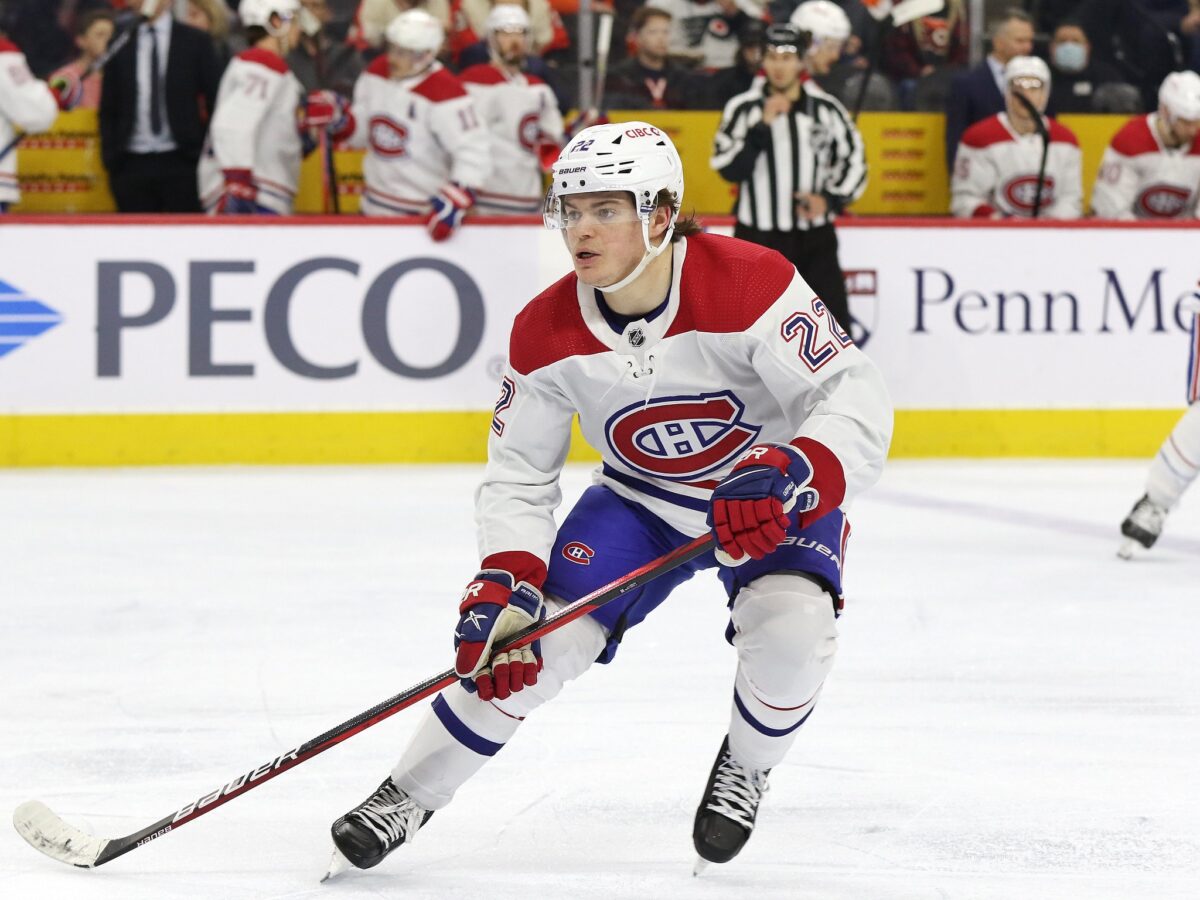
Truth be told, the same is true at right wing too, as the Canadiens boast several wingers who can line up on either side. Based on their deployment though, Caufield, Jonathan Drouin, Mike Hoffman, Rem Pitlick and Paul Byron all line up at left wing.
That means they’re five deep at left wing and it shouldn’t be lost on anyone that Byron is a multi-time 20-goal scorer with the Canadiens, albeit several years ago. Technically, that gives the Habs a left wing filled to the brim with players capable of playing in the top six, at least on paper, if not in practice.
In reality, the Canadiens would deal Byron’s contract for the cap space, similar to with Hoffman, as the latter hasn’t exactly proven to be a good fit on the team. Byron is still a defensive stalwart for the record. It’s just that his $3.4 million cap hit tends to hinder the Habs with him in that role. His contract is also expiring, like Drouin’s, so the position will look drastically different come 2023-24, one way or another.
If the Canadiens do manage to deal someone, Michael Pezzetta, arguably the Canadiens’ top call-up from last season, has the inside track to making his way into the lineup. Past him, Laval Rocket captain Rafael Harvey-Pinard projects as the next-best option. In terms of prospects yet to make their debut with the Habs, Emil Heineman, Sean Farrell and Jan Mysak place at the top of the list.
2. Right Wing
Technically, Josh Anderson ranks at the top of the heap at right wing as the most common complement to Caufield and Nick Suzuki on the first line. Since Anderson tends to top out at a 0.5 point-per-game pace (but over 20 goals per complete season), right wing is admittedly at a disadvantage from the get-go compared to other positions on this list. However, Anderson is by no means the only option.
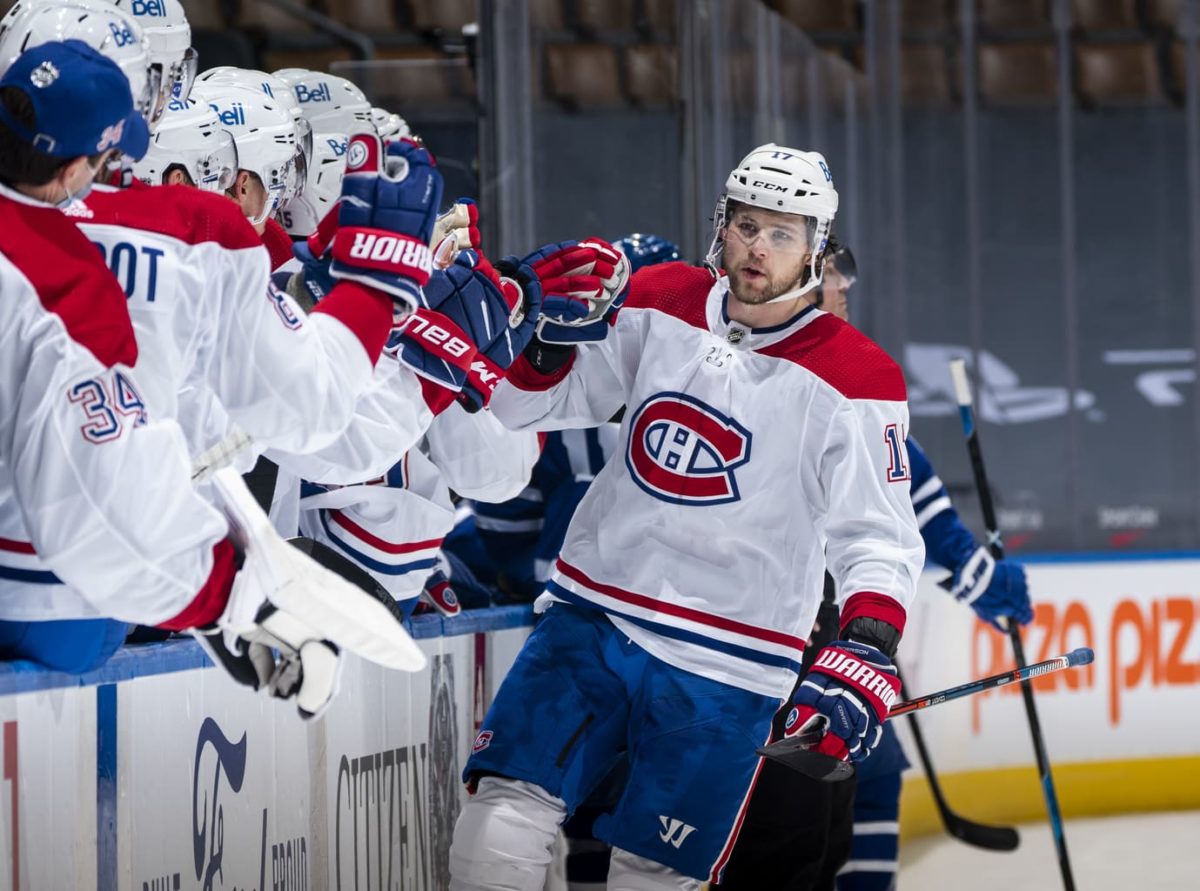
The Canadiens also have Brendan Gallagher and new acquisition Evgeny Dadonov. While Habs fans may not necessarily know what to expect from Dadonov, who could provide top-six production in the right situation, they should have a pretty good idea of what Gallagher can do, even if his performance hasn’t been up to his usual standards the last few seasons.
Once relied upon for ~30 goals per season, Gallagher scored just seven in 56 games last season. As a result, doubt’s set in, in only the first season of his six-year, $39 million deal. For glass-half-full types though, Gallagher acknowledged the issue at his post-mortem media availability, during which he said he’s confident he can get back to where he needs to be for 2022-23.
Joel Armia rounds out the top four, at a position filled primarily by players past their prime. However, on the way up, the Canadiens have got farmhand Jesse Ylonen, who made inroads to potentially earning a Canadiens roster spot out of training camp, with a 14-game audition this past season. There’s also Joshua Roy, one of their top prospects, who broke through in his first season after having been drafted, leading the Quebec Major Junior Hockey League in scoring as an 18-year-old.
Things could be worse in other words.
3. Left Defense
In some ways, the Canadiens’ left side on defense is the mirror image of the situation at right wing. With players like Ben Chiarot and Brett Kulak having been traded away this past season, it’s a position in transition, with the old guard comprising really just Joel Edmundson. Thankfully, it’s the deepest in terms of players on the rise.
Alexander Romanov has already established himself as a top-six defenseman with the Canadiens, despite being just 22 years old. Prospects on the rise in Jordan Harris and Mattias Norlinder have already gotten in NHL games. However, the best is potentially yet to come with Kaiden Guhle, arguably the team’s best prospect overall who projects as a top-pairing defenseman, on the verge of starting his professional career. He’s joined by other hopefuls like Jayden Struble and Arber Xhekaj.
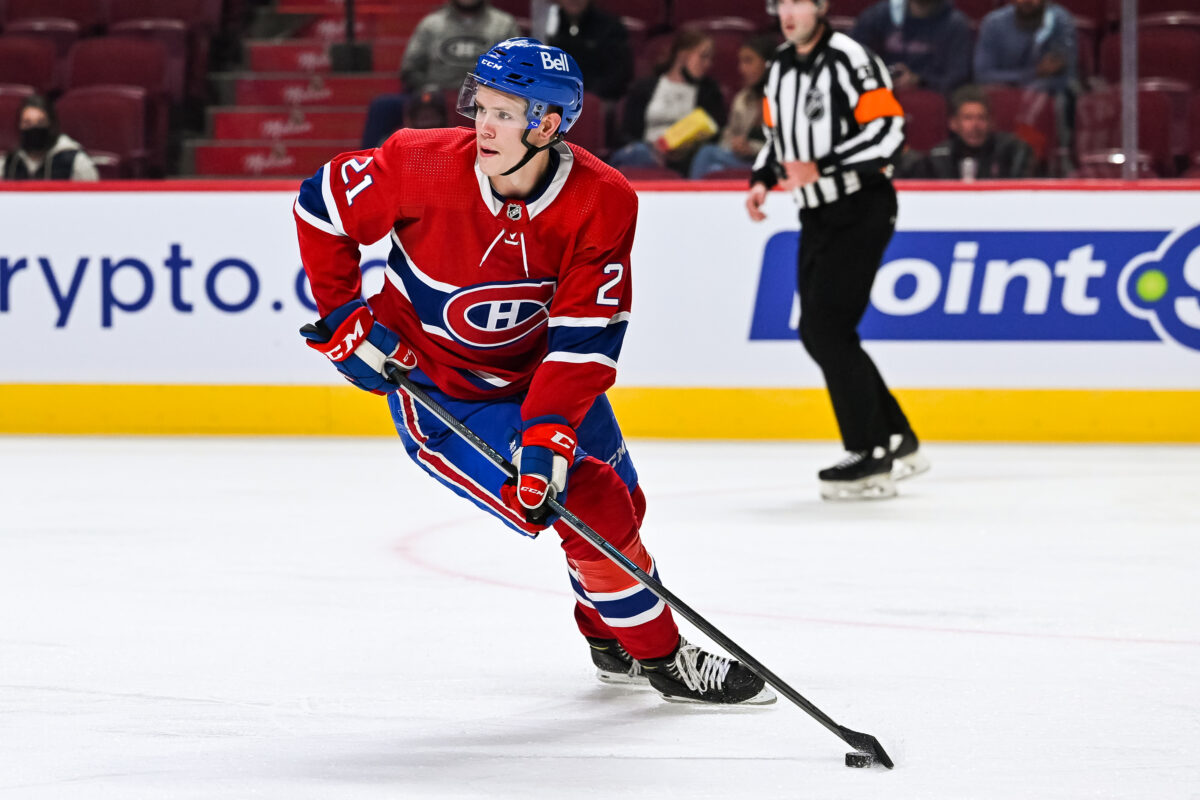
All things considered, the Canadiens’ left side on defense is where the Canadiens are deepest, organizationally speaking. It only ranks as low as it does here because, realistically, not all of the team’s LD prospects will pan out, leaving a lot up in the air.
4. Goaltending
The same can be said about the team’s goaltending, only with a great deal more uncertainty, especially regarding Carey Price. The team’s face of the franchise for the last 15 years give or take, Price may be healthy enough to play in 2022-23 after rehabilitating his knee for a large portion of last season. If not, Price’s contract could go on long-term injured reserve or, in something of a worst-case scenario (at least for him personally), he could actually retire.
Price is obviously a bona-fide No. 1 when healthy, so he’s kind of the linchpin here. If he’s healthy, the team’s situation in net improves dramatically. If not, Hughes would have to go out and acquire someone new, just to give them consistently competent starting goaltending.
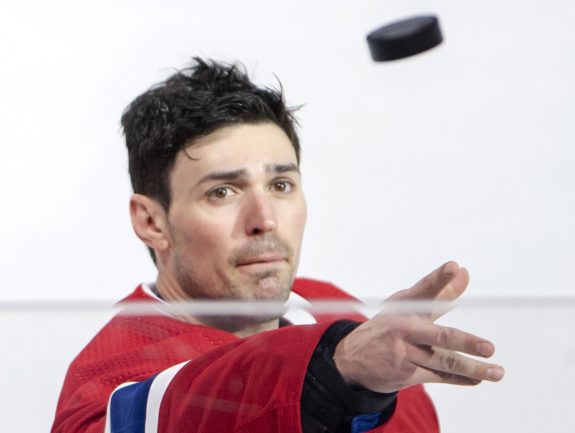
Simply put, other than Price there’s no one in the organization capable of filling the position right now. Even if Price is healthy, it’s unlikely he plays the same amount of games he has in the past. If Price isn’t healthy, all due respect to back-up Jake Allen, but history has shown he can’t handle the rigors of a No. 1’s workload.
On the plus side, Cayden Primeau proved over the course of the Rocket’s American Hockey League playoff run that he’s still a worthwhile prospect, who may have a bright future ahead of him. However, the plan was to give Primeau 200 AHL games. Considering his struggles in the NHL (albeit playing behind an AHL-caliber lineup), it would be wise for the Canadiens to take their time with him. He hasn’t even played half that.
Samuel Montembeault remains in the mix as a restricted free agent (RFA), but he also remains a third-string option at best, despite a personally signficant season, during which he played the lion’s share of games. Injuries of course played a part in him earning the opportunity, but he deserves credit for playing through a tough situation (and hurt wrist).
Nevertheless, if the Canadiens re-sign Montembeault (and he clears waivers if necessary), he probably tops out as a depth option and stop-gap measure as the Canadiens bide their time for prospects like Frederik Dichow, Jakub Dobes and Joe Vrbetic to develop. Goaltending is like voodoo, though. Even a slew of prospects in net far from guarantees the Canadiens hit the mark, aiming for their next No. 1.
5. Center
It was literally just a few seasons ago the Canadiens’ depth down the middle had been the envy of other teams… well, at least other Habs teams of the past two decades.
They had Suzuki, Phillip Danault and Jesperi Kotkaniemi, which in theory should have held them over for a half-decade at least. Now just Suzuki remains after Danault left for the Los Angeles Kings as an unrestricted free agent and Kotkaniemi for the Carolina Hurricanes as a RFA. Thankfully, Suzuki is the best of the bunch.
Suzuki may actually be the team’s best player right now and potentially that first-line center the team’s been lacking for those two aforementioned decades. For that reason alone, especially since he’s locked up through the prime years of his career, center takes the No. 2 slot (and not No. 1, as the Habs’ weakest position). However, no one comes close to matching Suzuki’s upside in the organization right now.
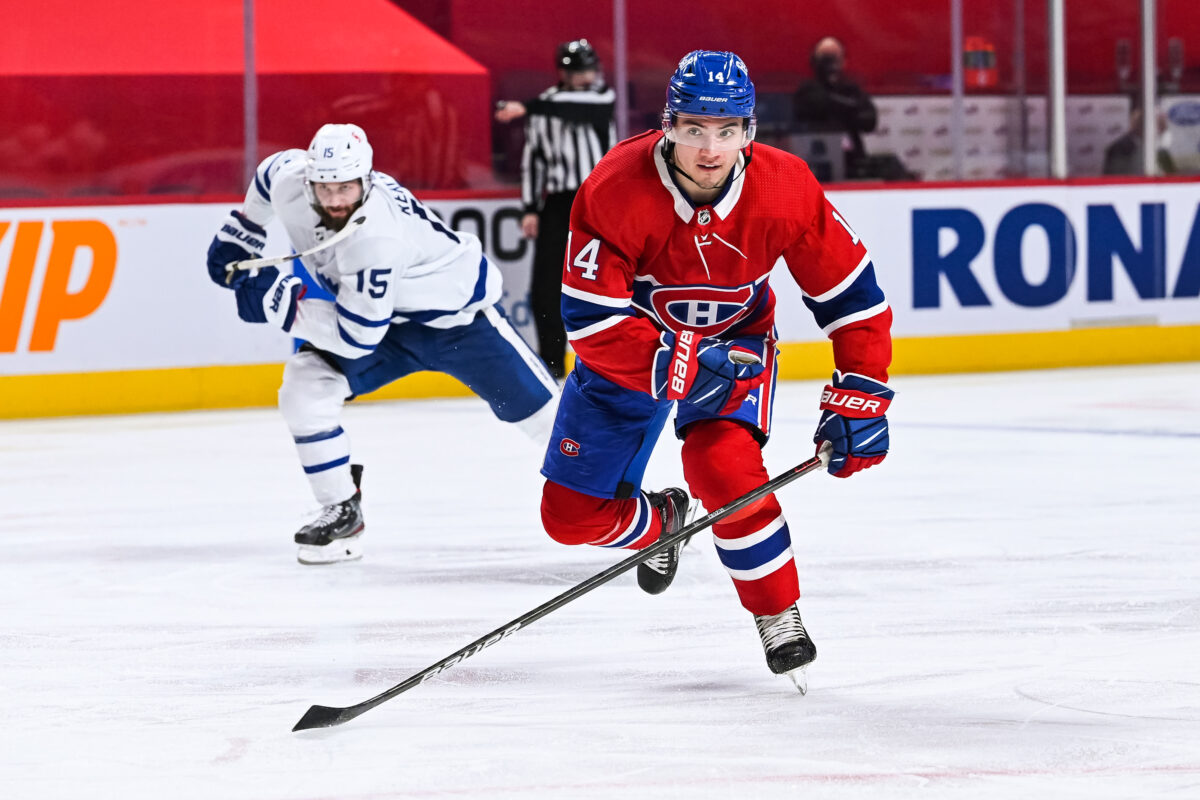
At 26, Christian Dvorak is a career 0.5-point-per-game player, which is perfectly fine. He’s just arguably been miscast as a second-line center, when, more accurately, he’s a middle-six one, with more of a slant to the third line. Below him on the depth chart, the Canadiens have Jake Evans, who has carved out a niche as a bottom-six forward, but admirably so, and Ryan Poehling who is a bit of a question mark.
Poehling, now 23, could maybe still pan out as a former first-round pick (2017), but he would have to take a giant leap forward from a deployment standpoint first. And, in the eyes of management, he only earned 12:12 in ice time last season. And that’s really it, in terms of NHL-ready Habs centers, with the just-signed Riley Kidney (No. 63 at the 2021 NHL Entry Draft) being the team’s top prospect pivot.
In fairness, there are obviously pieces besides Suzuki there, but the situation only becomes bearable were everyone below him to move down a rung on the depth chart. With that, the Canadiens are in dire need of a second-line center. If only there were some way for Hughes to address the problem in the not-too-distant future…
6. Right Defense
Like center, the team’s right defense is proof as to how quickly things can change at a given position. A few years ago, the Canadiens were flush on the right side with Shea Weber, Jeff Petry and maybe even Cale Fleury as an up-and-coming prospect.
Fast-forward, and now both Weber and Fleury are gone. Petry is realistically on his way out having requested a trade (from ‘Jeff Petry opent to remain in Montreal, but Canadiens might have other plans, Montreal Gazette, April 30, 2022). The right side on defense places last even under the unrealistic assumption Petry stays. It’s just in such a sad state of disrepair.
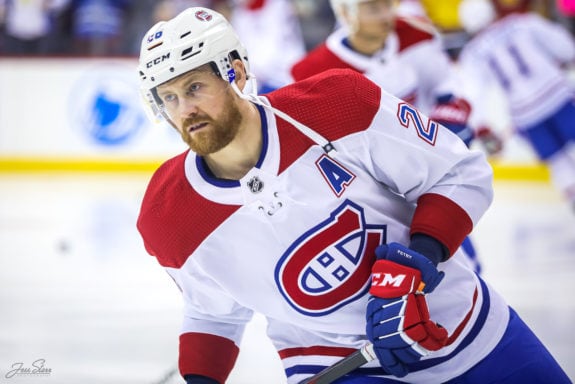
In his final offseason, Hughes’ predecessor, Marc Bergevin, did bring in David Savard and Chris Wideman to fill out the roster, but neither is a long-term solution. Bergevin also controversially drafted Logan Mailloux, who has the skills to enter the picture, but he’s under evaluation, ironically out of character concerns, and entry-level contract negotiations aren’t on the immediate horizon.
All that to say, the recently acquired Justin Barron is the team’s future on the right side, maybe even the present if he makes the Habs out of training camp after appearing in five NHL games down the stretch. Beyond Barron, the cupboards are fairly empty. To help alleviate the situation, Romanov for one example can switch sides, but call a spade a spade: The right side needs a lot of tender loving care.
In fact, there’s so much need for an influx of talent, under different circumstances the Canadiens would probably be using their first-overall pick to draft a right-handed defenseman like David Jiricek or Simon Nemec. However, neither of them are projected to be in the same echelon as centers Shane Wright and Logan Cooley or left-winger Juraj Slafkovsky and going off the board would be bad asset management, with Hughes having gone on record as saying the Habs intend on picking the best player available.
There are obviously conflicting rumors as to who that will be in the Canadiens’ eyes. Looking at this list though, the way they should go is fairly clear. Thankfully with 14 picks overall this summer, the Canadiens can go a long way addressing their other needs, especially with three other picks in the first two rounds. Not for nothing, but Weber (2003) and Petry (2006) were second-round picks back in the day. And, as the current state of disrepair on the right side shows, things can change in a hurry. Going in the other direction too.